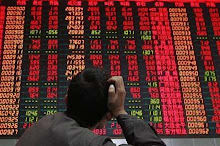ABC news reported the Dow dropping 800 points by mid-afternoon today and closing below the 10000 mark. Wow, thats even better. This has not happened since October 24, 2004 according to Alice Gomstyn and Scott Mayerowitz of the ABC News Business Unit. The Nasdaq went down 4.3% and the S&P went down 3% today. That's just in one day! "The Dow hit its lowest point of the day at 2:46 p.m., when it was down 800.06 points. What a difference a year makes. Almost a year ago, on Oct. 9, 2007, the Dow reached its all-time high closing of 14,164.53.The Dow ended today 4,209.03 points, or 29.7 percent, below that high," Gomstyn and Mayerowitz write.
But it's not just the United States proposing bailouts. As the ABC Business unit reports, Germany passed a $68 billion bailout for commercial-property lender Hypo Real Estate Holding AG and France's BNP Paribas
this is a chart of Britain's FTSE from Jan 2008 to today from the FTSE website
Going back to the Chronicle, the bailout will not help the economy at all. Even though, as they write in the article, "...the only thing worse than having a bailout would be having no bailout at all...We can't avoid a recession, but a bailout might keep the economy from falling off a cliff." But a complicated question is proposed: if we do not bailout these "wall street tycoons" what would like be like with no credit? Everyone would be affected, not just the bankers. Even state government's funds would be affected as last week, the Chronicle writes, "Governor Arnold Schwarzenegger went pleading for a $7 billion loan." And what does the bailout need to fix you ask? Why the mortgage crisis, where the entire problem began. With Secretary of Treasury Henry Paulson in control of $700 billion dollars, let's hope he knows what he is doing.

7 comments:
Great post especially in a time when there is so much going on with the market that it is hard to keep up with. We did see a large drop off in the market as soon as the house failed to pass the initial bailout, but what is even more concerning is that even with the passing of the second bailout we saw US and global markets tumble. Politicians and even Presidents can say what they want, but this is an example of how action was taken way to late and now we have to dig ourselves out of a huge hole. Do you know what specific part of the bailout the traders did not like, causing this huge fall out? Thanks.
The Brown Man,
The huge decreases in the stock market are quite shocking, but the decline in foreign economies also is much more surprising. If the global economy is declining, then this crisis must have extremely widespread effects. On the bailout plan, though, are there other economically unrelated initiatives in the bill? According to a source in my latest blog post, the ban on offshore drilling has recently been lifted in conjunction with a "spending bill." Is this spending bill the bailout plan you mention?
Tommy
Interesting information on the economic crisis. I am not surprised by the scram to create a supposed bailout to quelch the anger of people losing jobs, homes and their life savings. We live in a world economy now and whatever affects us will no doubt affect other countries economies as well. I believe this problem did not happen overnight therefore the solution will be need to target the core of the problem, is that too much deregulation? The free market system does need to have regulations so greed does not become the soul source of a company. I hope we all learn a lesson on not serving ourselves only when we manage other's money.
We need go to the root of the economic crisis issue -- root cause analysis. There are many factors and it is a very complicated problem. Everyone needs to take responsibility of this economic crisis issue. People started living beyond their means and start borrowing money rather than saving money. Along with this, easy access to credit, the problem became worse. Consumers need to pay down their debt and start saving and this is our main responsibility.
Wow, nice post. This was filled with a lot of information I wasn't aware of. You mentioned in your article that we couldn't avoid a recession, but the bailout was an attempt to save us from going off the clif. Do you believe that we are headed for a depression, or that because of the bailout and other factors, this will only be a recession?
Honestly, though, do we have any idea what will help? Maybe a bailout isn't good, and not having a bailout isn't either, but the big problem is that we have no idea if we can even do anything at this point.
I hate to be pessimistic about anything, but the current state of the economy merits some pessimism...
Justin
The constant declining of the World Market does bring a wave of hopelessness, however, the world and other countries (especially in Europe) think that a bailout plan will help solve this issue of the world economy plunging again. Although the Dow did drop 800 points, it closed after rising a few hundred points that day. Speculation, and proposals of bailouts are incentives for the market to hopefully jump a little. If the proposal of a bailout, or now "rescue," soothes the minds of the public, then the economy may go up a little bit. So a bailout hopes to serve not only as a means of permanently fixing the debt, but also serves as a catalyst for hope in the plummeting economy.
Post a Comment